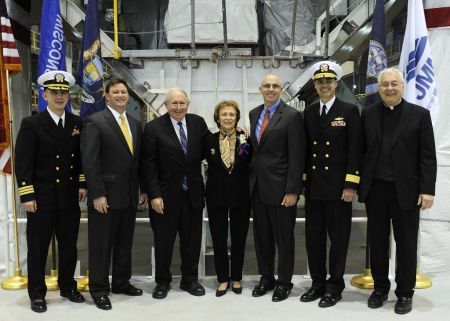
A Lockheed Martin-led industry team officially laid the keel for the U.S. Navy’s seventh Littoral Combat Ship (LCS), the future USS Detroit. The event was part of a time-honored keel laying ceremony that took place at the Marinette Marine Corporation shipyard in Wisconsin.
The Lockheed Martin LCS team is building the futuristic Freedom-variant LCS for the U.S. naval fleet. With the first two ships delivered, two additional ships in production and two more in early material procurement, the industry team is addressing the Navy’s need for an affordable, highly-networked and modular ship unlike any other in the world. This new class of combatants is designed to support a wide variety of missions including anti-submarine, surface and mine countermeasure warfare, shipping lane protection, and humanitarian aid.
“It’s an honor to participate in this event for the future USS Detroit,” said Sen. Carl Levin, D-Mich. “The keel laying ceremony marks a great milestone for the program and the naval fleet. These ships are vital to our national defense strategy and their production contributes significantly to the Wisconsin and Michigan economies.”
During the ceremony ship sponsor Barbara Levin authenticated the keel by having her initials welded into a sheet of the ship’s steel. She was assisted by the Navy’s Program Executive Officer – Littoral Combat Ships Rear Admiral James Murdoch.
“This ceremony marks the beginning of my commitment to supporting the future USS Detroit and the brave crews that will serve aboard her to defend our country,” said Barbara Levin. “It is a very moving moment for me, as I am very proud to serve as the sponsor of this powerful ship which honors my native city.”
The Lockheed Martin-led LCS team includes ship builder Marinette Marine Corporation, a Fincantieri company, naval architect Gibbs & Cox, as well as hundreds of domestic and international suppliers, including approximately 30 small businesses in Wisconsin and Michigan.
“Marinette Marine Corporation’s shipbuilding expertise, coupled with Lockheed Martin’s integrated and automated systems that bring the capability to fight, operate and support the ship, make the Freedom-variant LCS a powerful vessel,” said Joe North, vice president of Littoral Ship Systems for Lockheed Martin’s Mission Systems & Sensors business. “The LCS team continues to invest in shipyard improvements and has applied best practices to ensure we continue to be more efficient and more innovative with each new ship we build.”
By 2013, industry investment will total approximately $94 million, which includes nearly $70 million to date from Marinette Marine Corporation’s Italian parent Fincantieri-Cantieri Navali Italiani for shipyard improvements.
Lay the keel is a shipbuilding term that marks the beginning of the module erection process, which is a significant undertaking that signifies the ship coming to life. Modern warships are now largely built in a series of pre-fabricated, complete hull sections rather than a single keel, so the actual start of the shipbuilding process is now considered to be when the first module for the ship is erected in place and is often marked with a ceremonial event.
We use cookies to improve your experience. By continuing to use our site, you accept our Cookies, Privacy Policy,Terms and Conditions. Close X